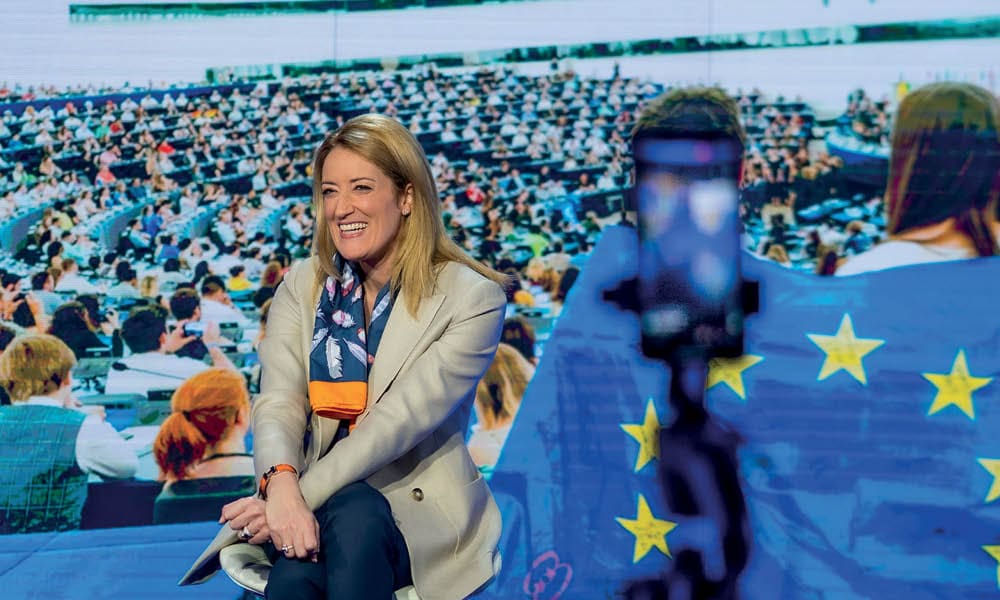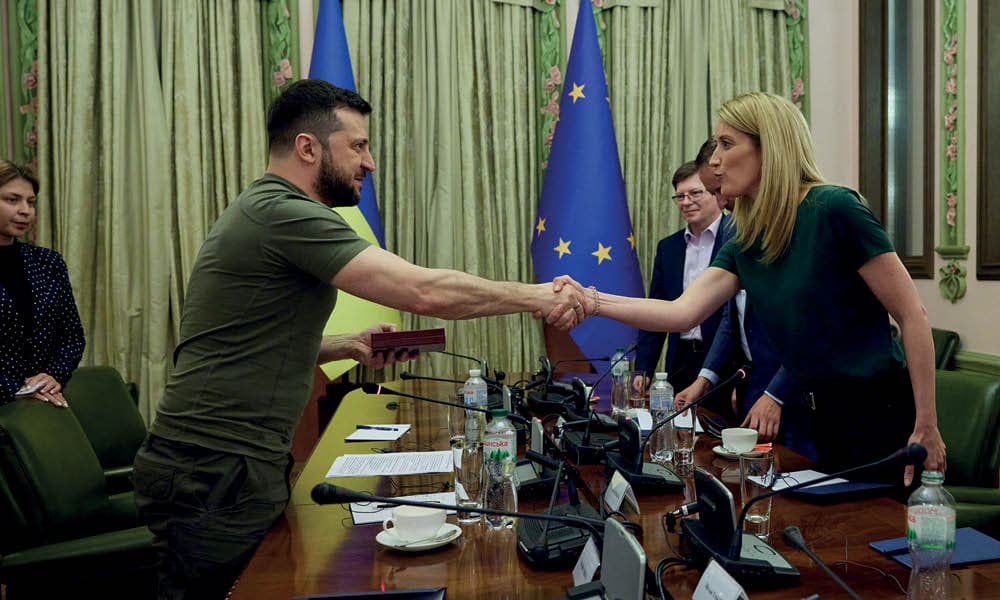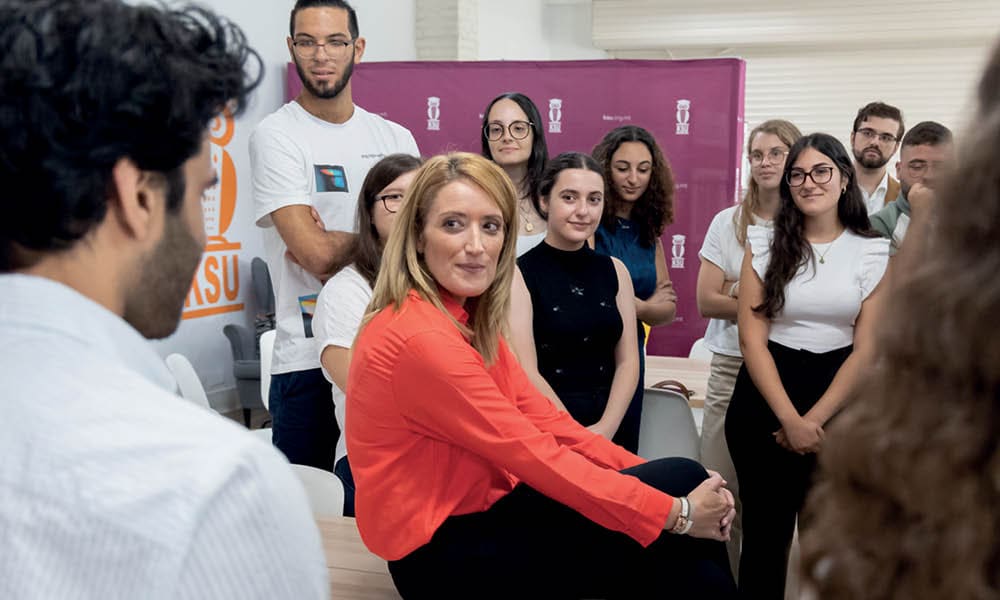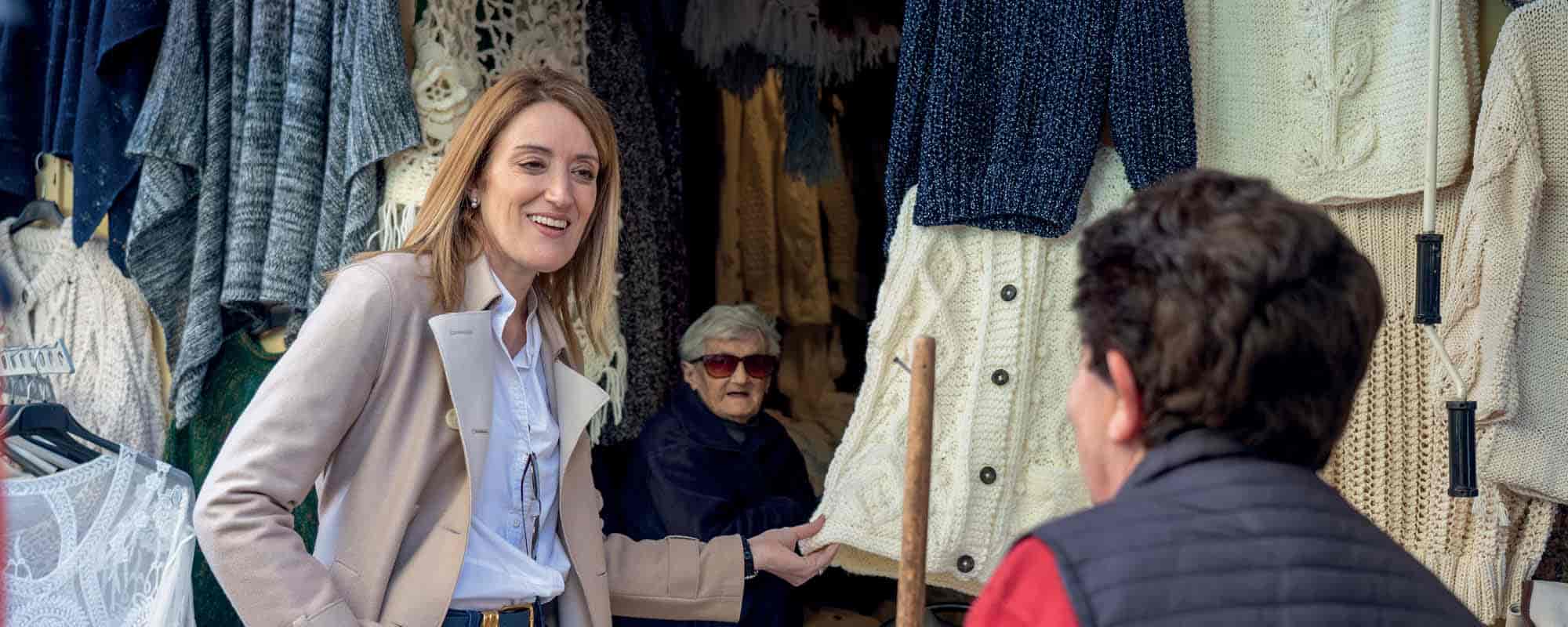Roberta Metsola took the helm of the European Union’s core decision-making body after a political career characterised by dedication and leadership prowess. With a year-long experience of being the President of the European Parliament, Metsola, a University of Malta (UM) alumna, talks to THINK magazine about the oft-bumpy road to the prestigious role.
Metsola comes from a family with no direct political party involvement, from a tiny country with a native population of around 500 thousand, and where the majority of people hold personal ties to the representatives of a largely bipartisan system. Like any other family, she would participate in casual political discussions during Sunday lunches. But then, Malta brought the potential Europan Union (EU) membership topic to the table in the early 2000s. At the time, she was studying at UM and felt the urge to be part of this dialogue.
‘This is where I started becoming politically active. I joined a student organisation at the university, and we started working to convince people to vote “yes” [for joining the EU] in the referendum. This was the first time I immersed myself in the political arena,’ Metsola told THINK in an exclusive interview about her career. One activity led to another, as she participated in debates, gave speeches, and eventually was asked by the Partit Nazzjonalista (PN), the Nationalist Party, to run for the European Parliament election. ‘My sixth form and university days, along with my various encounters, had helped me shape my idea of what politics is like, what the priorities should be, and how to engage with people. It gave me a taste of what was to come. It was not always easy, but it certainly was worth it,’ she said.
A professional career is studded with challenges in every vertical. Politics is no exception. Metsola put the adage—you only fail if you stop trying—into action. It took her a decade of work to get elected as a Member of the European Parliament (an MEP). ‘I remember knocking on doors with my two toddlers by my side, trying to convince people why they should vote for me to represent them. I did not get elected, twice, but I persevered and, in the end, was elected as one of the first Maltese female MEPs,’ she says.

Image courtesy of the European Parliament
During her early political journey as a youth, Metsola was involved with the European Democrat Students (EDS), the official student organisation of the European People’s Party (EPP), and later she joined the European Youth Forum (YFJ). Experiences at these organisations left her with a profound impact.
‘Being a member of both EDS and YFJ was incredibly important for me, in different ways. These experiences taught me immensely, but if I had to underline two main things, I would say that coming from the smallest member state should never hold us back from reaching our aspirations. And that it is crucial to build bridges and prioritise every single person. Working hand-in-hand with people from different political backgrounds is vital to achieving goals that will benefit society,’ Metsola said.
Enters the New President
Her involvement with politics was largely sparked by the ambition and aspiration of the Maltese and Gozitan people to become EU members. Her family’s support—who needed much convincing from her side—and then Prime Minister Lawrence Gonzi’s encouragement, made her contest the European Parliamentary elections. In 2013, she became an MEP from Malta, a role warranted by her commitment to public service and her active involvement within the PN. In November 2020, she assumed the role of the First Vice-President of the European Parliament under President David Sassoli. The spotlight shone on her with the tragic death of Sassoli. On 18 January 2022, she was elected the European Parliament’s President, after a historic election in turbulent times. Her victory marked several significant milestones. She became the youngest-ever President of the European Parliament, the first Maltese person to hold this prestigious office, and the first woman to hold the title since 2002.
‘Being the first Maltese to become the President of the European Parliament, is a responsibility that I carry out on behalf of the Maltese people who trusted me with their vote,’ Metsola said. Following a tough campaign of meeting MEPs, listening to how they wanted to reform the European Parliament, and convincing them to choose Metsola as a representative, she assumed the position at the peak of an overwhelming, emotional moment.
‘I understood the immense responsibility of that outcome. This was a big result for women worldwide, particularly in Malta. The main message was that a young woman from Gżira could do it, and so can you,’ Metsola says. Gżira is a tiny town of 1.5 square kilometres, housing a bit more than ten thousand people. Her success in taking such a prominent position serves as a memento that glass ceilings can be shattered and stands as a testament to women taking political action in a field that has been traditionally characterised by men. It is also an inspirational tale for a tiny nation geographically isolated from the European continent in the middle of the Mediterranean, burdened by colonial history woven into the social fabric of Maltese and Gozitans.
Now steering the ship with many eyes on her voyage, what are Metsola’s main objectives in the role? ‘My goals for my term in office have been simple: Getting people closer to the European Union and getting out of our post-pandemic recovery period to regain our vibrant union,’ she said. As if cutting through the uncharted waters of the pandemic’s aftermath was not enough, Russia’s war on Ukraine in the bloc’s immediate periphery has complicated geopolitical and global economic matters. ‘But it has been a clear reminder that we could not take our values for granted, and I believe that we have made steady progress in getting people closer to the European Union. Europe is about all of us standing up for one another, bringing people close, defending everything our mothers and fathers worked so hard for after years of wars and conflicts. We must work towards this vision by leaving egos aside and applying the principles that have provided Europe with so much prosperity while adapting to today’s issues,’ Metsola said.

Image courtesy of the European Parliament
Time for the Youth in Politics
An increasingly polarised atmosphere on both ends of the Atlantic calls for active political action. Politics globally needs the youth’s involvement, their fresh and ubiquitous perspective, more than ever—a hard feat in a world where the young seem apolitical, nurturing a general apathy towards ageing, talking heads. A lot needs to be done. But what do our communities need in these times?
‘If I can sum it up in a few words, I would say: Ask, think critically, vote, and contest. Do not give up on politics. I am always ready to discuss where they think we could have done better as their representatives. But voting is crucial. It allows us to make our voices heard. Ultimately, I also want to see more youth involved in the political process, including idea generation, campaigning, and implementation. I want to see more young people running for local, general, and European elections, speaking about how they believe the country, the EU, or their locality can improve. There should never be an empty space in politics. If the right people do not step up, that space will still get filled,’ Metsola said.
Politics is a hard venue to navigate. Considering the tough competition, women need to emerge above the traditional binary masculine versus feminine personality trait debate, and courageously participate in politics. It is everyone’s game now. ‘Unfortunately, the reality is that women don’t have it easy. Society imposes a lot of pressure, expectations, and barriers for women to get into the political world. That did not stop me. I believed in my abilities. I believed in what I was campaigning for and did not let anything hold me back. At the same time, the European Parliament understands that it also needs to do its part in removing any discriminatory barriers. That is why it is introducing new legislation such as the “Women on Boards and Equal Pay for Equal Work Directives”. But for us to be successful in this, what we really need is a paradigm shift in thinking and culture. As women, we must constantly answer questions about being mothers and how we support the family. I think this needs to change,’ Metsola said.
Women need more role models, especially in leadership roles. Not only in politics but also across the board. ‘I am proud of the European Parliament’s work to instil change. Despite the challenges, women in leadership positions have transformed the world. Women in business, women in STEM, women in education, women in the arts and journalism. They have broken barriers and disposed of taboos in history’s dustbin,’ she said.
Desiring Constructive, Healthy Dialogue
Metsola insists dialogue must remain ripe with the topics mentioned above, especially to make women’s contributions to society more visible. ‘I would not be here today if it was not for the resilient Maltese and Gozitan women who had to endure for so long to make my path towards becoming an MEP and President of the European Parliament possible. And I want to repay that going forward. Every time we fall—whether in politics or life, we all do—we are pulled back up by another woman who has been through it all before us. And that is my appeal when I speak to young girls across our union: We must pull each other up,’ Metsola said.

Image courtesy of Martin Agius
Universities are the perfect arenas for discussions, leading debates, and inspiring change. ‘Our university should be an idea-sharing hub and a playground for continuous discussion. It can lead by example by ensuring women with the required credentials are promoted to leadership positions and given the prominence they deserve. Educational institutions can organise campaigns, and serve as a breeding ground for new politicians. There are a lot of things we can do,’ Metsola said.
And we gravely need universities to endorse critical thinking and civil discourse. Information exchange is reshaping due to online channels facilitating misinformation’s rampant, toxic spread. We must nurture constructive public dialogue among voting citizens; it must come from political leaders. ‘We need to be careful. We need to debate arguments, not people. We must respect people’s intelligence and sustain a high level of debate,’ Metsola said.
We need politics that break out of the partisan mould and flow along the lines of actions to build a better future for every generation. ‘The politics of hate belongs in the past. We must stand tall in front of those forces who prey on people’s fear to sow division,’ she said. Metsola believes the younger generation understands that right or wrong has no political affiliations. ‘They know that we can disagree without hating each other. That we are a community above all. I am hopeful that change is coming, generations are shifting, and this old way will simply not cut it anymore,’ Metsola concluded.





Comments are closed for this article!